A German woman's success story in the Ottoman Empire
1816 - 1898, Jagshausen, Smryna (Izmir)
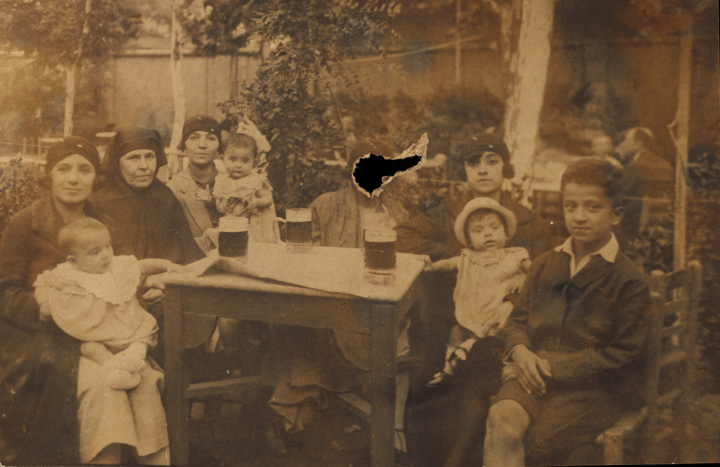
1918, Turkish beer garden, a family gathering in Istanbul Source: Türkiye Tarih Vakfi
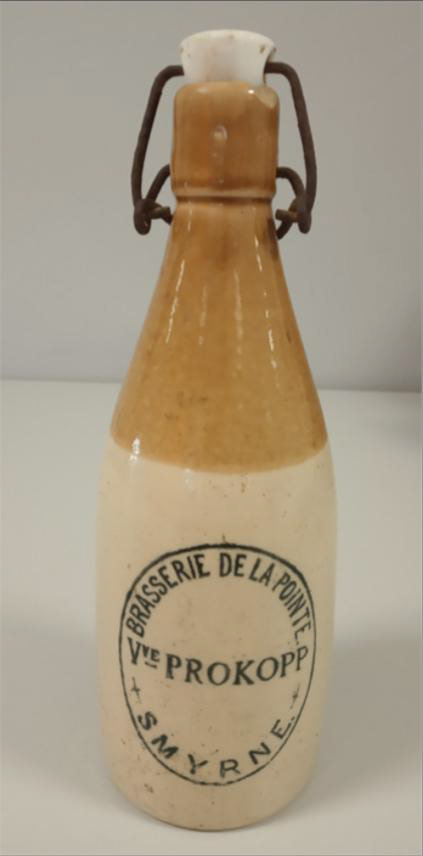
Original beer bottle Source: www.levantineheritage.com
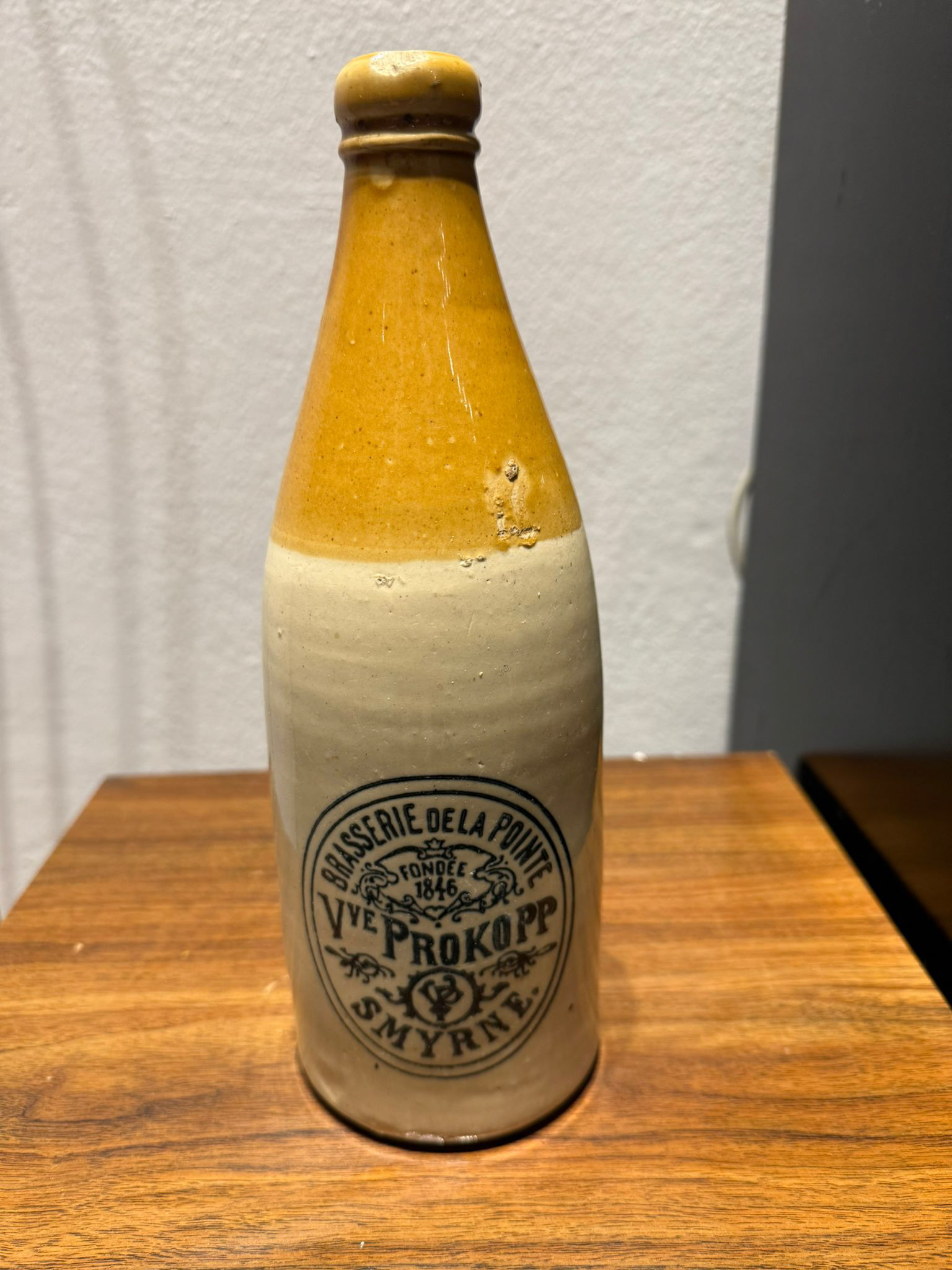
Undated, an original ceramics bottle of Veuve Prokopp beer from Smyrna. Source: Hülya Ede Uçta
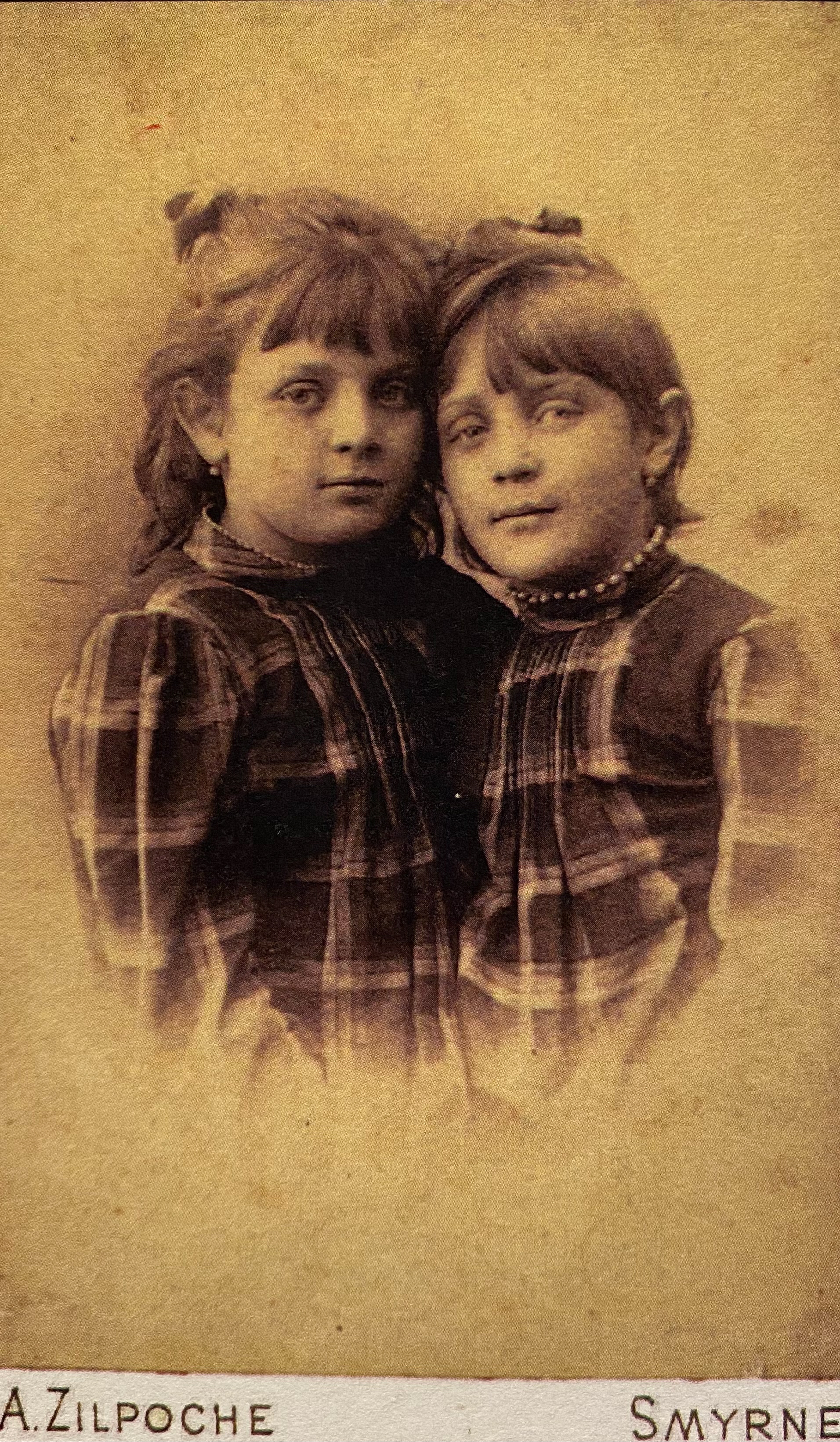
1890, Gertrude and Hulda Prokopp, the daughters of Arnold Prokopp, the son of Clara. Source: Sally Elliott, Smyrna, one family’s tale, 2013 Photo: TAM Museum
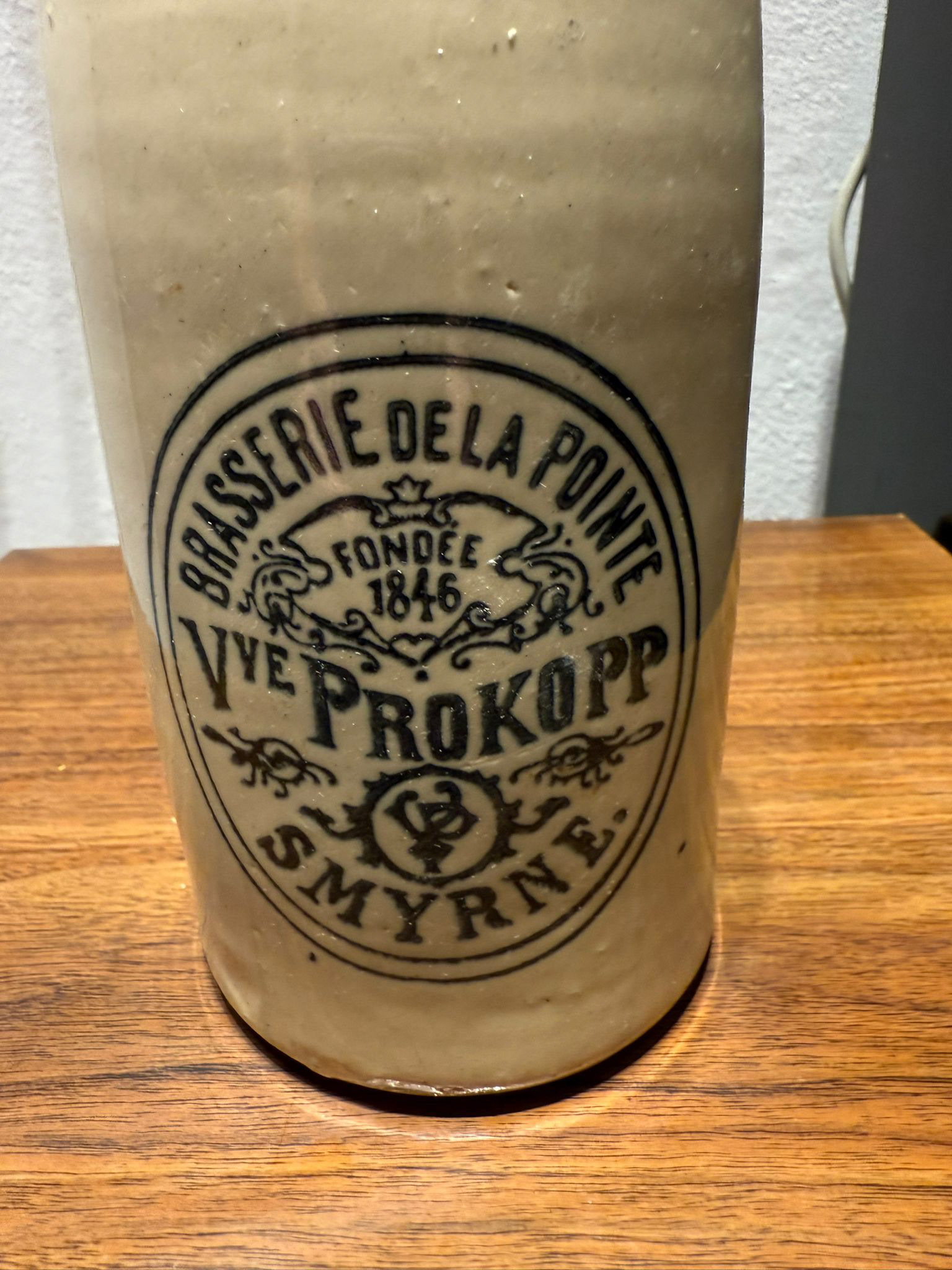
Undated, an original ceramics bottle of Veuve Prokopp beer from Smyrna. Source: Hülya Ede Uçta
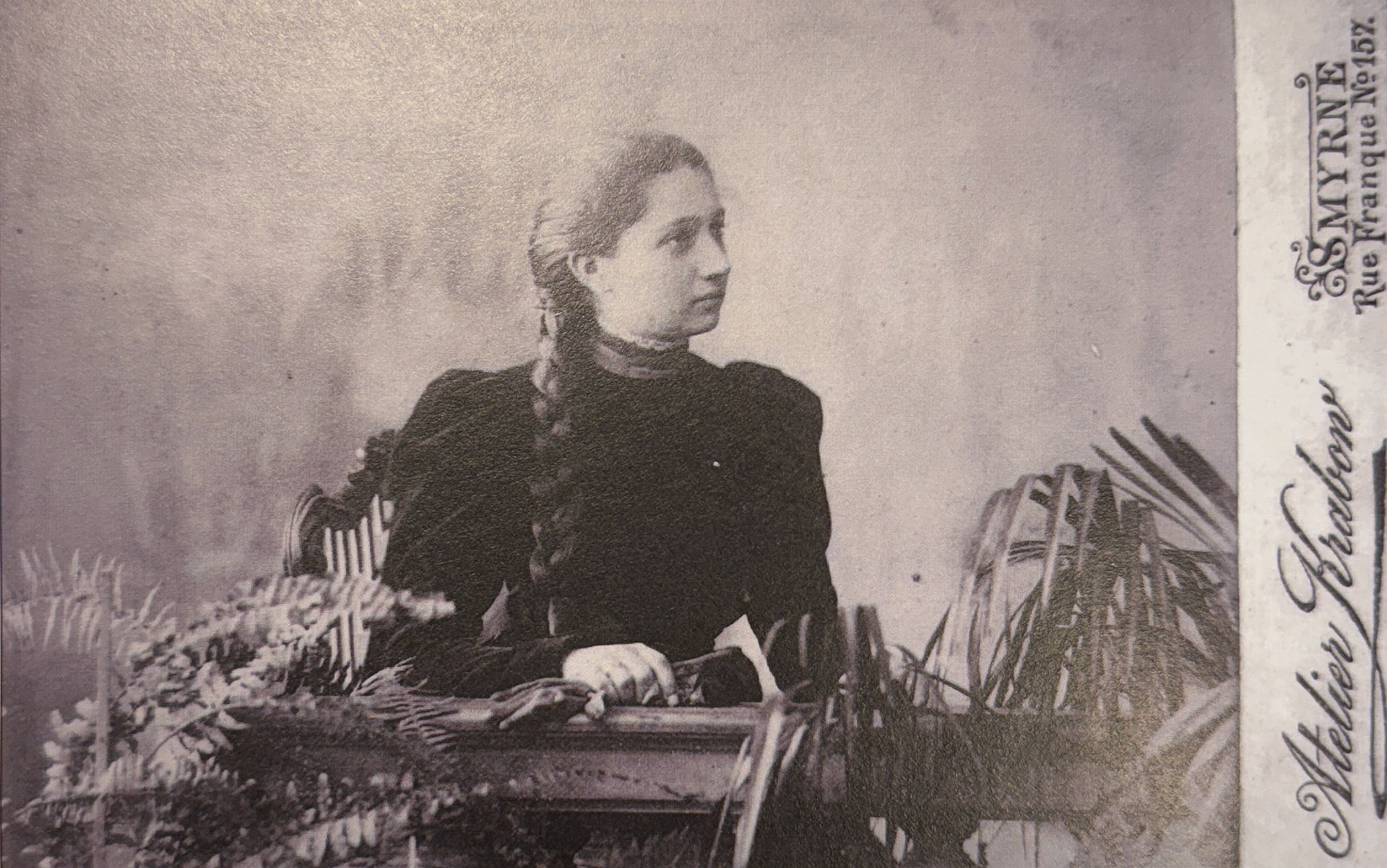
1898, Hedwig (Hetty) Stengel, daughter of Carl Stengel son from from Clara Prokopp’s first marriage. Source: Sally Elliott, Smyrna, one family’s tale, 2013 Photo: TAM Museum
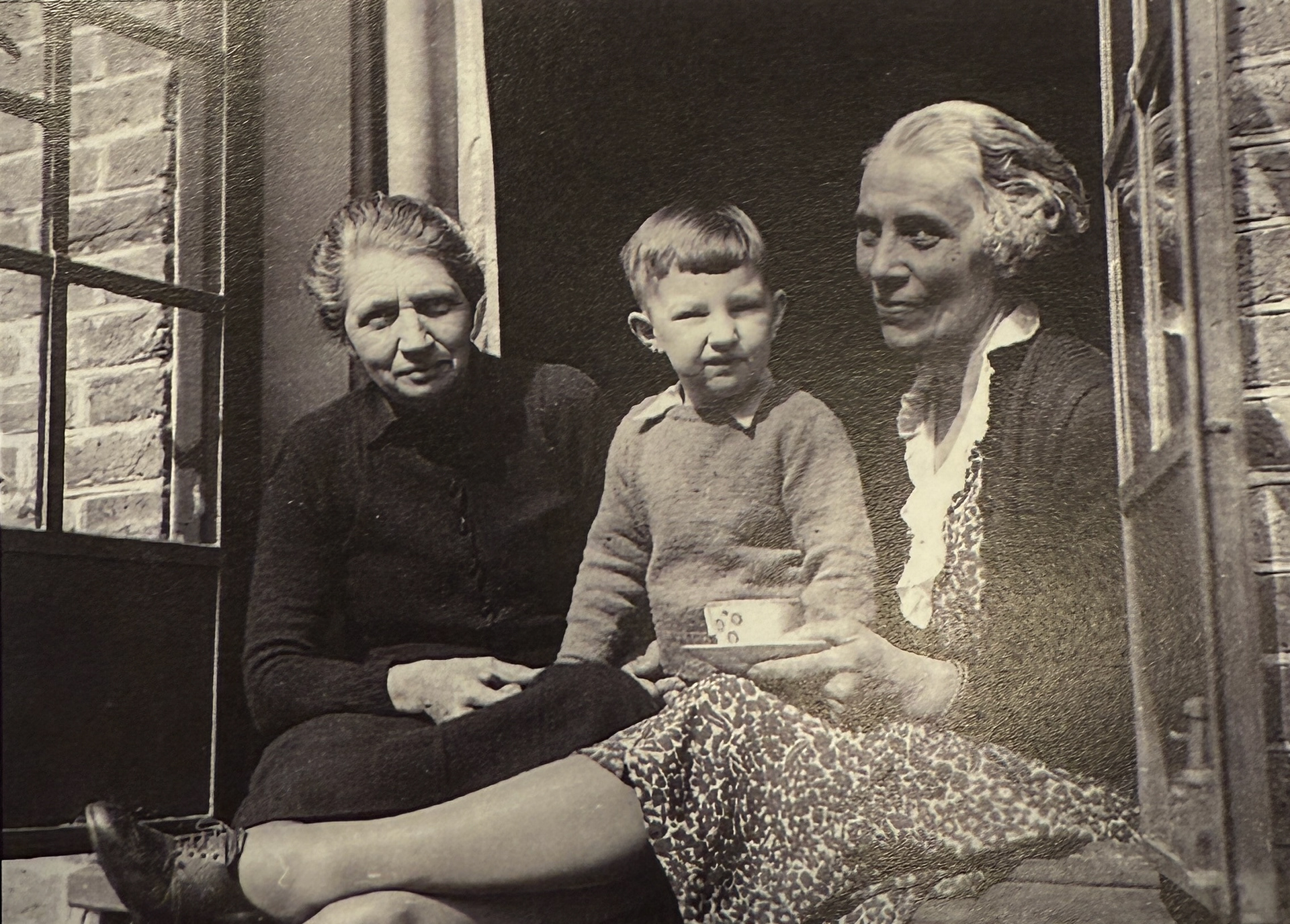
1940, Hetty and Hulda with Mark Ransome in England, Hetty is the grandmother of Mark and Hulda was called “auntie“. Source: Sally Elliott, Smyrna, one family’s tale, 2013 Photo: TAM Museum
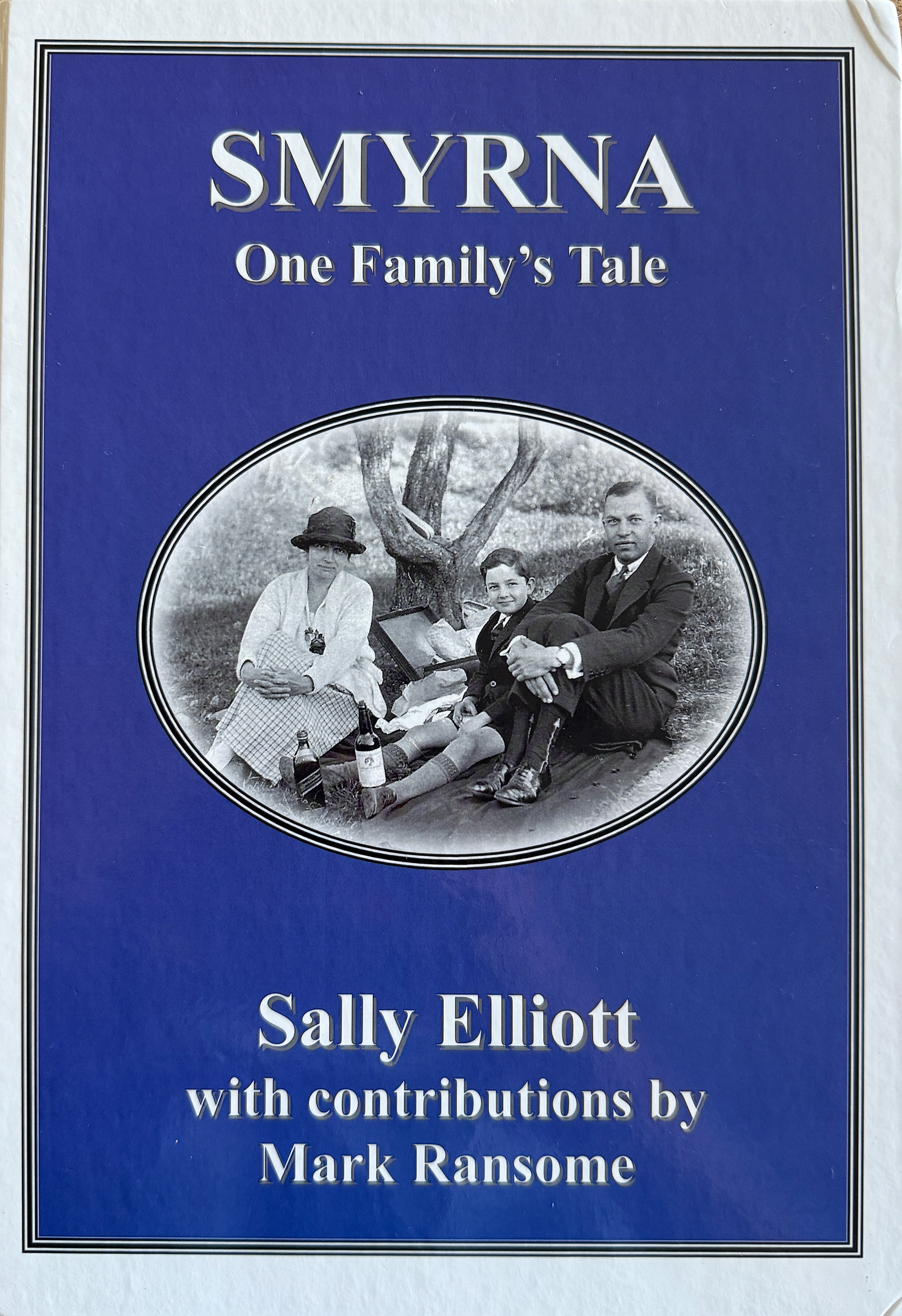
2013, cover of the book on Sally Elliotts family history Sally Elliotts mother was May Ransome (born Walker), She was the daughter auf Hetty and Charles Walker. Hetty was the daughter of Carl Stengel (Clara Prokopps first son). Source: TAM Museum library Photo: TAM Museum
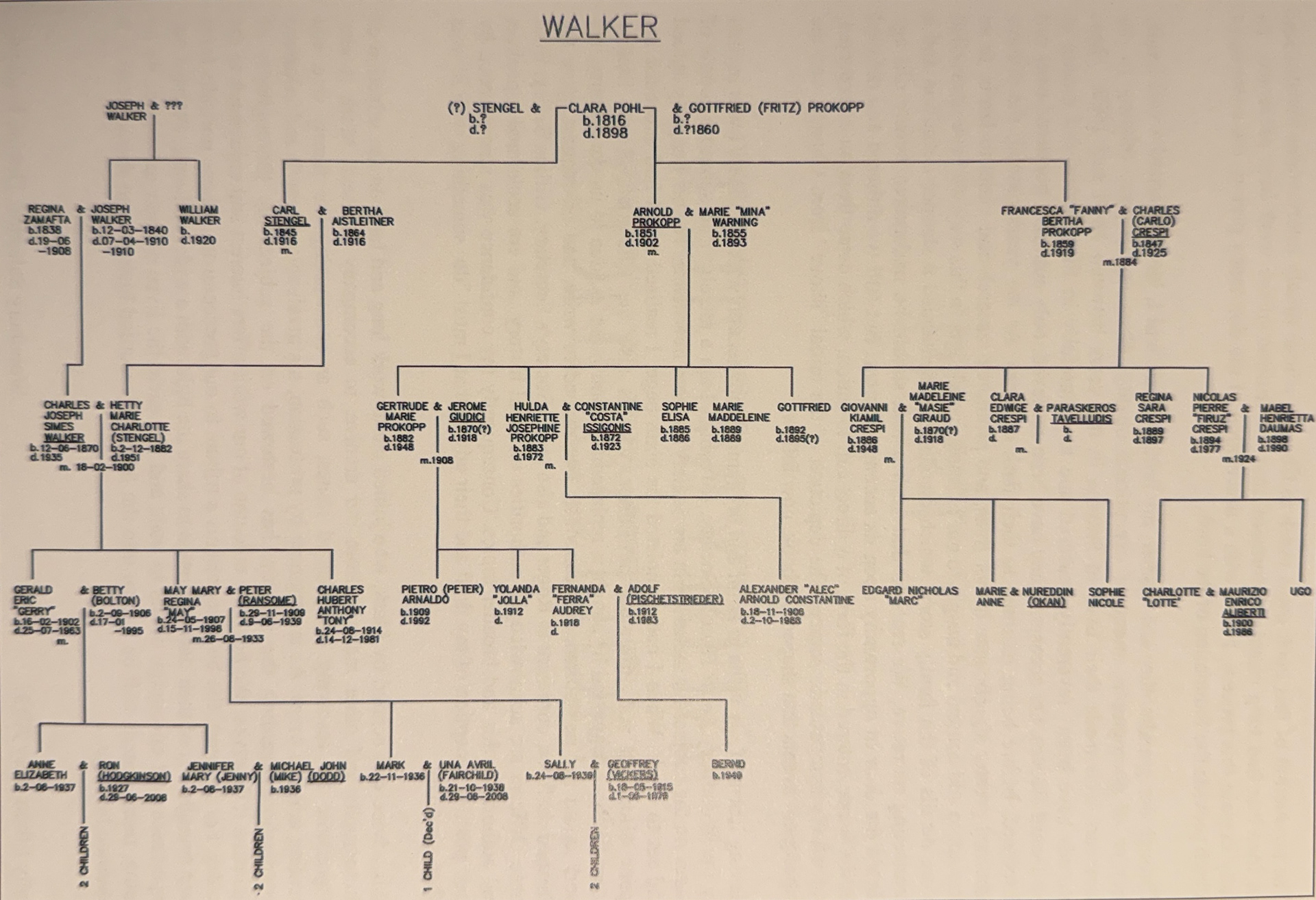
Prokopp and Walker Family Tree, researched and written by Mark Ransome Source: Sally Elliott, Smyrna, one family’s tale, 2013 Photo: TAM Museum
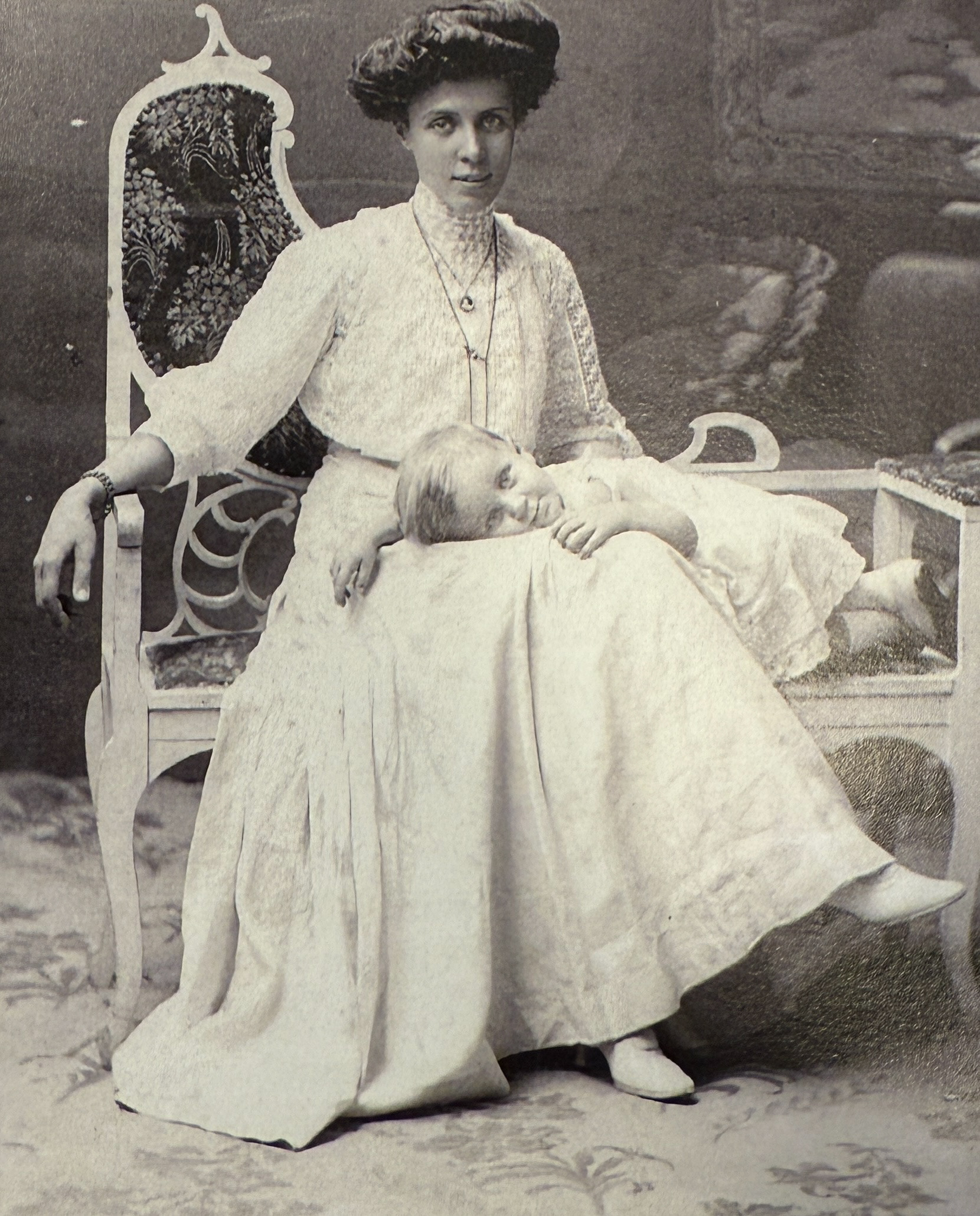
1907, Hulda with son Alexander Arnold (Alec) Issigonis Source: Sally Elliott, Smyrna, one family’s tale, 2013 Photo: TAM Museum
At the start of the 19th century, beer was practically unknown in the Ottoman Empire. Yet by the century’s end, a German author witnesses a ‘Bierkultus’ (beer cult) in Smyrna, linked to a certain ‘Baba Procop.’ Behind this rise of beer in Smyrna, however, lies above all the story of a woman: Clara Prokopp.
A New Brewery in Smyrna
We know little about Clara Prokopp’s childhood and family background. She was born in 1816 in Jagsthausen, north of Stuttgart, under the maiden name Pohl. With her first husband, Herr Stengel—whose first name remains unknown—she settled in Smyrna in 1840, where they established a brewery in 1845. That same year, their son Carl Stengel (1845–1916) was born, but Herr Stengel died shortly afterwards.
Beginning of the Industrial Beer Production
Clara sent word back to Württemberg for a new manager, who arrived in the person of Gottfried Prokopp, an accountant. Clara married him, and together they had two children: Arnold (1851–1902) and Francesca, known as Fanny (1859–1919). Gottfried’s death around 1860 left Clara a widow once again, still in her forties. Her resilience and skill, however, were evident: the brewery flourished, her beer became widely renowned and was marketed under the now-famous label “Veuve Prokopp” (“Widow Prokopp”). The brand’s presence was literally set in stone—beer bottles bearing the label were embedded into the brewery wall by the main entrance at Bornova Street, in the middle of the district that due to the vicinity to the train station and the quays was becoming the new center of town.
At the time, beer was rapidly becoming popular in Smyrna and the western parts of the Ottoman Empire. Originally consumed mostly by expats from Western and Central Europe, beer became popular with the locals as of the middle of the nineteenth century, replacing wine as the second-most popular alcoholic drink (after rakı/arak/ouzo/mastika). In the mid-nineteenth century, there were many small breweries run either by immigrants from Western and Central Europe or Christian or Jewish Ottoman subjects. However, many of them opened and closed within a few years. The Prokopp family business was not only the leading beer producer of Smyrna and Aydın Province, but also the longest continuously operating brewery in the entire Ottoman Empire.
A Business of Three Families
By the latter part of the century, Clara’s three children had married and expanded the family network. Carl Stengel married Bertha Aistleiter (1864–1916), originally from Austria. Arnold Prokopp married Mina Warning (1855–1893) from Germany. Fanny Prokopp married Charles Crespi (1847–1925), who had Balkan roots.
After Clara’s death in 1898, her three children and their spouses carried on the brewery as a family syndicate: Arnold oversaw the accounts, Carl and Bertha managed beer production, while Charles and Fanny Crespi handled the business side. Early on, the families each built separate houses within the brewery compound, which reinforced their bonds and gave the next generation a sense of growing up as siblings rather than cousins.
The children of these families formed a lively, close-knit group. They included Hedwig “Hetty” Stengel (1882–1951), daughter of Carl and Bertha, four Crespi children, and the surviving daughters of Arnold and Mina, Gertrude (1882–1948) and Hulda (1884–1972).
Evacuation and the End of the Smyrna Era
The early 20th century brought profound upheaval. With the collapse of the Ottoman Empire and the catastrophic events of 1922, the cosmopolitan life of Smyrna came to an abrupt end. Like many European and Levantine families, the Stengel–Prokopp–Crespi descendants were evacuated shortly before the end fo the Greco-Turkish War. Their departure marked the closure of the brewery and the end of the Veuve Prokopp enterprise in Smyrna.
The families were first evacuated to Malta, where they stayed temporarily, before moving on to the British Isles, where new lives had to be built under very different circumstances. The long and successful Smyrna chapter of their history ended in exile, as the thriving cultural developments of the city that had nurtured the family business were extinguished in fire and forced migration.
In the United Kingdom, the family members remained closely connected. Among them was Hulda Issigonis, born Prokopp. Tragically, her Greek husband Costa Issigonis had died in Malta during the journey, struck by illness. Hulda went on to raise their only son, Alec Issigonis, who later became an engineer and wrote history as the celebrated designer of the iconic Austin Mini car.
Clara Prokopp’s Resting Place
Clara herself, however, did not live to witness these events. She died in 1898 and is buried in Smyrna, where her grave remains at the local churchyard. Remarkably, the site is still preserved and can be visited today, offering a tangible link to the remarkable story of a pioneering woman who built a legacy from resilience, migration, and entrepreneurship in the 19th-century Ottoman world.
Evidently her name has not been forgotten because in 2024 a group of people opened a beer store in Izmir claiming to revitalize the cult of the former Veuve Prokopp brewery, naming it ‘Madame Prokopp’ though. The Prokopp descendants, however, sued them for using the name.
Clara Prokopp’s story and her renowned beer label Veuve Prokopp is a neglected history of a woman, a popular drink, and the largely forgotten migrations from Germany to the Ottoman Empire. It raises the question of why such stories are absent from schoolbooks, which instead focus on soldiers, wars, kingdoms, and other military narratives. Viewing the past from a different angle does not diminish its importance; rather, it helps us connect with it more closely and recognize how even distant regions were deeply intertwined – a mission to which the TAM Museum is dedicated.
Prokopp-Bier
Die Erfolgsgeschichte einer deutschen Frau im Osmanischen Reich
Zu Beginn des 19. Jahrhunderts war Bier im Osmanischen Reich praktisch unbekannt. Doch gegen Ende des Jahrhunderts berichtet ein deutscher Autor von einem „Bierkultus“ in Smyrna, der einem gewissen „Baba Procop“ zu verdanken sei. Hinter diesem Aufstieg des Bieres in Smyrna steht jedoch vor allem die Geschichte einer Frau: Clara Prokopp.
Eine neue Brauerei in Smyrna
Wir wissen wenig über Clara Prokopps Kindheit und familiären Hintergrund. Sie wurde 1816 in Jagsthausen, nördlich von Stuttgart, unter ihrem Geburtsnamen Pohl geboren. Mit ihrem ersten Ehemann, Herrn Stengel (sein Vorname ist unbekannt), ließ sie sich 1840 in Smyrna nieder, wo sie 1845 eine Brauerei gründeten. Im selben Jahr wurde ihr Sohn Carl Stengel (1845–1916) geboren, doch Herr Stengel starb kurz darauf.
Beginn der industriellen Bierproduktion
Clara ließ aus Württemberg nach einem neuen Geschäftsführer rufen, der in der Person des Buchhalters Gottfried Prokopp kam. Clara heiratete ihn, und gemeinsam hatten sie zwei Kinder: Arnold (1851–1902) und Francesca, genannt Fanny (1859–1919). Im Jahr 1860, Clara war noch in ihren Vierzigern, machte Gottfrieds Tod sie erneut zur Witwe. Ihr unternehmerischer Geist und ihre Tatkraft waren jedoch ungebrochen: Ihr Bier, das sie nun unter dem Etikett „Veuve Prokopp“ („Witwe Prokopp“) vermarktete, wurde weithin bekannt, die Brauerei blühte auf. Ihre heute berühmte Marke wurde buchstäblich in Stein gemeißelt – Bierflaschen mit dem Etikett wurden in die Brauereimauer am Haupteingang in der Bornova-Straße eingelassen, mitten in dem Viertel, das durch die Nähe zum Bahnhof und den Kaianlagen zum neuen Stadtzentrum wurde.
Zu dieser Zeit wurde Bier in Smyrna und den westlichen Teilen des Osmanischen Reiches rasch populär. Ursprünglich vor allem von Expats aus West- und Mitteleuropa konsumiert, wurde Bier ab der Mitte des 19. Jahrhunderts auch bei der einheimischen Bevölkerung beliebt und verdrängte den Wein als das zweithäufigste alkoholische Getränk (nach Rakı/Arak/Ouzo/Mastika). In der Mitte des 19. Jahrhunderts gab es viele kleine Brauereien, die entweder von Einwanderern aus West- und Mitteleuropa oder von christlichen oder jüdischen Untertanen des Osmanischen Reiches betrieben wurden. Viele von ihnen öffneten jedoch nur für wenige Jahre und schlossen wieder. Das Unternehmen der Familie Prokopp war nicht nur der führende Bierproduzent von Smyrna und der Provinz Aydın, sondern auch die am längsten durchgehend betriebene Brauerei im gesamten Osmanischen Reich.
Ein Geschäft von drei Familien
Gegen Ende des Jahrhunderts hatten Claras drei Kinder geheiratet und das Familiennetzwerk erweitert. Carl Stengel heiratete Bertha Aistleiter (1864–1916) aus Österreich. Arnold Prokopp heiratete Mina Warning (1855–1893) aus Deutschland. Fanny Prokopp heiratete Charles Crespi (1847–1925), der Balkanwurzeln hatte.
Nach Claras Tod im Jahr 1898 führten ihre drei Kinder und deren Ehepartner die Brauerei als Familienunternehmen weiter: Arnold beaufsichtigte die Buchhaltung, Carl und Bertha leiteten die Bierproduktion, während Charles und Fanny Crespi den geschäftlichen Teil übernahmen. Schon früh bauten die Familien jeweils eigene Häuser innerhalb des Brauereikomplexes, was ihre Bindungen verstärkte und der nächsten Generation das Gefühl vermittelte, wie Geschwister und nicht wie Cousins aufzuwachsen.
Die Kinder dieser Familien bildeten eine lebendige, eng verbundene Gruppe. Unter ihnen waren Hedwig „Hetty“ Stengel (1882–1951), Tochter von Carl und Bertha, vier Crespi-Kinder sowie die überlebenden Töchter von Arnold und Mina, Gertrude (1882–1948) und Hulda (1884–1972).
Evakuierung und Ende der Smyrna-Ära
Das frühe 20. Jahrhundert brachte tiefgreifende Umwälzungen. Mit dem Zusammenbruch des Osmanischen Reiches und den katastrophalen Ereignissen von 1922 fand das kosmopolitische Leben Smyrnas ein abruptes Ende. Wie viele europäische und levantinische Familien wurden auch die Nachkommen der Familien Stengel–Prokopp–Crespi kurz vor Ende des Griechisch-Türkischen Krieges evakuiert. Ihre Abreise markierte die Schließung der Brauerei und das Ende des Unternehmens Veuve Prokopp in Smyrna.
Zuerst wurden die Familien auf Malta untergebracht, von dort aus übersiedelten sie auf die Britischen Inseln, wo sie sich unter sehr unterschiedlichen Umständen eine neue Existenz aufbauen mussten. Das lange und erfolgreiche Smyrna-Kapitel ihrer Geschichte endete im Exil, da die blühende kulturelle Entwicklung der Stadt, die das Familienunternehmen genährt hatte, in Feuer und Zwangsmigration untergegangen war.
Im Vereinigten Königreich blieben die Familienmitglieder eng miteinander verbunden. Unter ihnen war Hulda Issigonis, geb. Prokopp. Ihr Mann Costa Issigonis war während der Reise in Malta an einer Krankheit gestorben. Hulda zog ihren einzigen Sohn Alec Issigonis alleine groß, der Ingenieur wurde und als gefeierter Designer des ikonischen Autos Austin Mini in die Geschichte einging.
Clara Prokopps Ruhestätte
Clara selbst erlebte diese Ereignisse nicht mehr. Sie starb 1898 und wurde in Smyrna begraben. Ihre Grabstätte kann bis heute besucht werden und bietet eine greifbare Verbindung zur bemerkenswerten Geschichte einer deutschen Migrantin und Pionierin, die im 19. Jahrhundert dank ihres unternehmerischen Geistes und ihrer Resilienz ein Vermächtnis schuf.
Offensichtlich ist ihr Name nicht vergessen: 2024 eröffnete eine Gruppe in Izmir ein Biergeschäft, das beansprucht, den Kult der ehemaligen Veuve-Prokopp-Brauerei wiederzubeleben – allerdings unter dem Namen „Madame Prokopp“. Die Nachkommen der Familie Prokopp klagten aber gegen die Verwendung des Namens.
Die Geschichte von Clara Prokopp und ihrem berühmten Bierlabel Veuve Prokopp ist eine vernachlässigte Geschichte über eine Frau, ein beliebtes Getränk und die weitgehend vergessenen Migration von Deutschen ins Osmanische Reich. Sie wirft die Frage auf, warum solche Geschichten in Schulbüchern fehlen, die sich stattdessen auf Soldaten, Kriege, Königreiche und andere militärische Narrative konzentrieren. Die Vergangenheit aus einem anderen Blickwinkel zu betrachten, schmälert ihre Bedeutung nicht – vielmehr hilft es uns, uns früheren Zeiten näher zu fühlen und zu erkennen, wie selbst entfernte Regionen eng miteinander verflochten waren. Diese anderen Perspektiven sichtbar zu machen, ist ein Auftrag, dem sich das TAM Museum widmet.
Prokopp Birası
Osmanlı İmparatorluğu’nda bir Alman kadının başarı hikâyesi
Yüzyılın başlarında bira, bir içki olarak Osmanlı İmparatorluğu’nda neredeyse hiç bilinmiyordu. Ancak yüzyılın sonlarında Alman bir gezgin, Smyrna’da doğan yeni bir bira kültüründen (Bierkultus) bahseder. “Baba Prokop” ismiyle anılan bu kültün ardında aslında bir kadının hikâyesi vardır: Clara Prokopp.
İzmir’de yeni bir bira fabrikasının kuruluşu
Clara Prokopp’un çocukluğu ve aile geçmişi hakkında çok az şey biliniyor. 1816’da Stuttgart’ın kuzeyindeki Jagsthausen’de, kızlık soyadı Pohl olarak doğdu. İlk eşi Bay Stengel (ilk adı bilinmiyor) ile evlendi ve 1840’ta İzmir’e yerleşti. Burada 1845’te başarılı bir bira fabrikası kurdular. Aynı yıl oğulları Carl Stengel (1845–1916) doğdu, fakat Bay Stengel kısa süre sonra öldü.
Endüstriyel üretimin başlangıcı
Clara, Württemberg’den yeni bir yönetici çağırdı; muhasebeci Gottfried Prokopp geldi. Clara onunla evlendi ve iki çocukları oldu: Arnold (1851–1902) ve Francesca “Fanny” (1859–1919). Clara’nın ikinci kocasının 1860 civarındaki ölümü, onu yine kırklı yaşlarında dul bıraktı. Ancak onun direnci ve yeteneği ortadaydı: bira fabrikası gelişti, birası büyük bir ün kazandı ve artık ünlü olan “Veuve Prokopp” (“Dul Prokopp”) etiketiyle pazarlanıyordu.
Markanın varlığı adeta İzmir’in kaldırımlarına kazındı; etiketini taşıyan bira şişeleri Bornova Sokağı’ndaki ana giriş duvarında sergilendi ve kentin yeni merkezi haline gelen, istasyona ve rıhtımlara yakın bölgede görünürlük kazandı.
O dönemde bira, İzmir’de ve Osmanlı’nın batı bölgelerinde hızla popülerleşti. Başlangıçta çoğunlukla Batı ve Orta Avrupa’dan gelen göçmenler tarafından tüketilen bira, 19. yüzyılın ortalarından itibaren yerliler arasında da popüler oldu ve şarabın ardından ikinci en popüler alkollü içki hâline geldi (rakı/arak/ouzo/mastika’dan sonra). 19. yüzyıl ortalarında, ya Batı ve Orta Avrupa’dan gelen kolonistler ya da Osmanlı’nın Hristiyan veya Yahudi tebaası tarafından işletilen birçok küçük bira fabrikası vardı. Ancak bunların çoğu birkaç yıl içinde kapanıyordu. Prokopp ailesinin işletmesi yalnızca İzmir ve Aydın Vilayeti’nin önde gelen bira üreticisi olmakla kalmadı, aynı zamanda Osmanlı İmparatorluğu’ndaki en uzun süre kesintisiz faaliyet gösteren bira fabrikası oldu.
Üç ailenin işi
Yüzyılın sonlarına doğru Clara’nın üç çocuğu evlendi ve aile genişledi. Carl Stengel, Avusturya asıllı Bertha Aistleiter (1864–1916) ile evlendi. Arnold Prokopp, Almanya’dan Mina Warning (1855–1893) ile evlendi. Fanny Prokopp ise Balkan kökenli Charles Crespi (1847–1925) ile evlendi.
Clara’nın 1898’deki ölümünden sonra üç çocuğu ve eşleri bira fabrikasını bir aile ortaklığı olarak sürdürdüler: Arnold muhasebeyi denetledi, Carl ve Bertha bira üretimini yönetti, Charles ve Fanny Crespi ise işin ticari kısmını üstlendi. Aileler erken dönemde bira fabrikasının arazisi içinde ayrı evler inşa ettiler; bu da bağlarını güçlendirdi ve sonraki nesillere kuzen değil, kardeş gibi büyümeyi öğretti.
Bu ailelerin çocukları canlı ve birbirine sıkı sıkıya bağlı bir grup oluşturdu. Aralarında Hedwig “Hetty” Stengel (1882–1951), Carl ve Bertha’nın kızı; dört Crespi çocuğu; ve Arnold ile Mina’nın hayatta kalan kızları Gertrude (1882–1948) ve Hulda (1884–1972) vardı.
Kaçış ve İzmir döneminin sonu
Yüzyılın başı büyük değişiklikleri beraberinde getirdi. Osmanlı’nın çöküşü ve 1922 İzmir Yangını’yla birlikte İzmir’in kozmopolit yaşamı acı bir şekilde sona erdi. Stengel–Prokopp–Crespi ailesinin torunları gibi birçok Avrupalı ve Levanten aile kaçmak zorunda kaldı. İzmir’den ayrılışları, bira fabrikasının kapanışını ve İzmir’deki Veuve Prokopp markasının ve kültürünün sonunu getirdi.
Aileler önce geçici olarak Malta’ya mülteci olarak gitti, ardından Birleşik Krallık’a yerleştiler; burada çok farklı ülkelerde yeni hayatlar kurmak zorundaydılar. Aile şirketini besleyen kültürel kökler ateş ve zorunlu göçle yok olurken, aile tarihlerinin uzun ve başarılı olan İzmir bölümü sürgünle sona erdi.
Birleşik Krallık’ta aile ağları sıkı ve bağlı kaldı. Aralarında, Costa Issigonis ile evlendikten sonra Hulda Issigonis adıyla anılan Hulda Prokopp da vardı. Ne yazık ki Costa yolculuk sırasında Malta’da hastalıktan öldü. Hulda, daha sonra efsanevi Austin Mini otomobilinin tasarımcısı ve kurucu babası olacak tek oğulları Alec Issigonis’i büyüttü.
Clara Prokopp’un mezarı
Clara’nın kendisi ise bu olaylara tanıklık etmedi. 1898’de öldü ve İzmir’de gömüldü; mezarı bugün hâlâ yerel kilise mezarlığında korunmaktadır. Dikkat çekici bir şekilde, bu alan hâlâ ziyarete açık ve 19. yüzyıl Osmanlı dünyasında direniş, göç ve girişimcilikten bir miras inşa eden öncü bir kadının hikâyesini hatırlatan bir anıt olarak yer alır.
Yıllar geçse de bu isim unutulmadı; çünkü 2024’te İzmir’de eski Veuve Prokopp bira fabrikasının kültünü yeniden canlandırmayı iddia eden bir grup, bir bar ve bira atölyesi açtı. Ancak izinsiz bir şekilde ismi kullandıkları için haklarında Prokopp ailesi tarafından dava açıldı.
Clara Prokopp’un hikâyesi ve onun ünlü bira markası Veuve Prokopp, bir kadının, popüler bir içkinin ve Almanya’dan Osmanlı’ya uzanan büyük ölçüde unutulmuş göçlerin tarihidir. Veuve Prokopp’un hikâyesi bize dünyanın ve yaşanan tarihlerin ne kadar derinden bağlantılı olabileceğini ve onları keşfetmenin ne kadar keyifli olduğunu hatırlatıyor. Bu, neden bu tür hikâyelerin okul kitaplarında yer almadığını düşündürüyor. Neden bunun yerine askerler, savaşlar, krallıklar ve diğer askerî anlatılar öne çıkarılır?
Geçmişe farklı perspektiflerle bakmak önemini azaltmaz; aksine onunla daha yakın bağ kurmamıza ve unutulan tarihlerin bile derinden birbirine bağlı olduğunu görmemize yardımcı olur. Bu da TAM Müzesi’nin kendini adadığı bir misyondur.
Sources:
Sally Elliott and Mark Ransome, SMYRNA – One Family’s Tale, Exetor, Devon, 2013
Malte Fuhrmann, Port Cities of the Eastern Mediterranean, urban culture in the late Ottoman Empire, 2020
Smyrna Catholic Cathedral records, Vol 2, Act. No. 232
